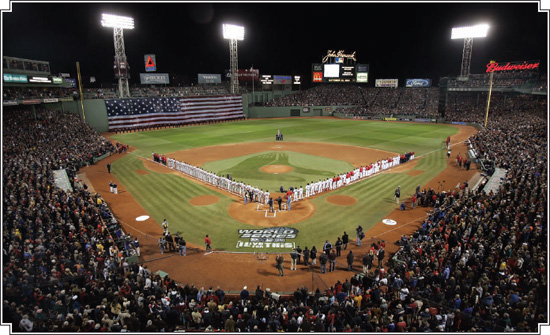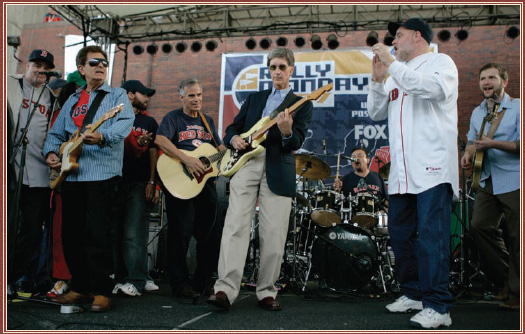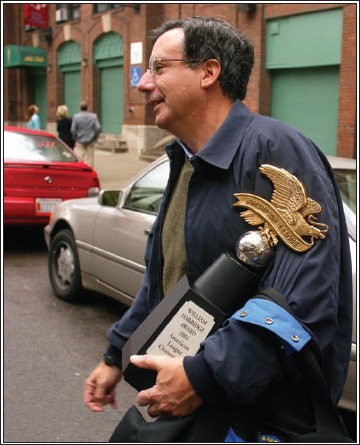Fenway Park (53 page)
Authors: John Powers
A fan was rewarded for keeping the faith in the 2004 AL Championship Series against the Yankees: David Ortiz rounded third after hitting a home run in the eighth inning of Game 5, which Boston went on to win, 5-4, in 14 innings.
Resurrections had become routine. So when Boston came from two runs down to force a seventh game with a 9-6 victory, anything seemed possible. Before the Sox took the field, the Fenway grounds crew painted a 2003 World Series logo on the grass behind home plate. “They’re crazy!” remarked Yankee closer Mariano Rivera. “It’s silly. . . . Maybe they want to believe they won.”
The finale, with Martinez and Clemens dueling again, was more painful than the 1986 World Series nightmare in Queens. With his club ahead, 5-2, in the bottom of the eighth and a fresh bullpen in reserve, Little left Martinez on the mound as the Yankees rallied and erased the Sox lead. The season slipped away in the 11
th
inning when pinch hitter Aaron “Boone-bino” Boone, a light-hitting infielder, lofted a Wakefield knuckler into the left-field seats. “Go back to Boston, boys, good-bye!” New York owner George Steinbrenner crowed as the buses pulled out of the stadium lot.
That was the end for Little, who was let go before the end of the month. “Yes, we came up short of our goal,” Little acknowledged in a statement, “and to the Red Sox Nation I say: I hurt with each of you. It was painful for all of us.”
For his successor, the front office selected Terry Francona, who knew about working in a demanding town after managing for four years in Philadelphia. “Think about it for a second,” said Francona, who’d been a big-league player like his father, Tito. “I’ve been released from six teams. I’ve been fired as a manager. I’ve got no hair. I’ve got a nose that’s three sizes too big for my face and I grew up in a major-league clubhouse. My skin’s pretty thick. I’ll be okay.”
Prospects for an autumn rematch seemed remote in 2004 after the Sox had fallen well behind the Yankees by late July. But one startling turnabout at Fenway foreshadowed what ranks as the greatest resurrection in baseball history. Aroused by a brawl touched off by Varitek shoving his mitt in Alex Rodriguez’s face after he’d been plunked by Bronson Arroyo, the Sox rallied from two runs down in the ninth and won on Bill Mueller’s two-run homer off Rivera.
“I hope we look back a while from now and we’re saying that this brought us together,” Francona said. “I hope a long time from now we look back and say this did it.”
That set the stage for another October showdown with New York. But Boston first had to finish off the Angels, who arrived at Fenway on the verge of extinction in their divisional series after being hammered twice at home. What the Sox needed, on the heels of setting a dubious record by blowing a 6-1 lead in the seventh, was a coup degrace. Ortiz provided it with a two-run shot over the Green Monster off Jarrod Washburn with two outs in the 10
th
for an 8-6 triumph and the second Sox sweep of a postseason series since 1903.

Fenway was more than ready for World Series action as Game 1 got underway in 2004. A historic sweep was ahead.
“Now we have two more celebrations to go,” observed Theo Epstein, who had become the youngest general manager in MLB history two years earlier when the Red Sox named him their GM at the age of 28.
That seemed impossible when Boston dropped the first two games of the championship series at New York, and then absorbed an ugly 19-8 smackdown at home that was the worst postseason loss in franchise history. No major-league ball club in history had won a seven-game series after losing the first three matchups. The only way to do it, Francona pointed out, was to win one each day.
His club came within one inning of a devastating sweep, trailing by a score of 4-3 in Game 4 with Rivera on the mound in the ninth. Then Kevin Millar drew a leadoff walk and the greatest comeback in MLB history was underway.
Dave Roberts, who’d been picked up from the Dodgers at the trading deadline as a speedy spare part, was sent in as a pinch runner and stole second on the next pitch. Then Mueller knocked him in with a single to center to tie the game and send it into extra innings. David Ortiz won it in the 12
th
with a two-run homer into the visiting bullpen off Paul Quantrill at 1:22 a.m. “This is a team that never gives up,” Ortiz declared after Boston had won the five-hour duel by a 6-4 count. “Great heart.”
The Sox again defied probability later that same day with another far-fetched escape. This time, it was a 5-4 triumph that required 14 innings and five hours and 49 minutes to complete, and ended with another killing blow from Ortiz, whose two-out single to center scored Johnny Damon. “To continually do it night in and night out, it’s ridiculous,” marveled Red Sox first baseman Doug Mientkiewicz. “It’s a freak of nature.”
Had Ortiz not clouted a homer in the eighth to help his teammates climb out of a two-run hole, the season likely would have ended an inning later. “Being down 3-0 and being down the last two nights shows the depth, the character, the heart, the guts of our ball club,” proclaimed Wakefield, who collected the victory as Boston’s seventh pitcher. “And it took every ounce of whatever we had left to win tonight’s game and to win last night’s game.”
Still, the Sox trailed, 3-2, in the series going back to the Bronx, where the previous season had ended painfully. “We’re in the same position as last year and we came awfully close,” Henry observed. “But the odds are still against us.”
Yet the club continued its historic resurrection in Babe Ruth’s old playpen as Curt Schilling, pitching on a sutured right ankle that bled through his sock, dazzled the Yankees, 4-2, in Game 6. Then Derek Lowe starved the hosts in the finale and Damon crushed them with a second-inning grand slam. “How many times can you honestly say you have a chance to shock the world?” crowed Millar after the 10-3 knockout that put Boston into the World Series for the first time since 1986.

STANDELLS GET A SECOND ACT
BY BRIAN MACQUARRIE
Any time the Red Sox prevail at Fenway Park, you hear it: the slinky raunch of the guitar, the snide snarl of the vocals, the backhanded celebration of Boston in the lyrics. Hundreds of thousands of Sox fans recognize the Standells’ “Dirty Water” as the unlikely anthem for their beloved team and city.
But for one Red Sox fan in California, “Dirty Water” means much more. For Dick Dodd of Buena Park, the song’s surprising staying power has provided a link to his rock ‘n’ roll past, which included opening for the Rolling Stones, and a connection to a place he had never seen before “Dirty Water” came out.
Dodd sang the 1960s proto punk ode to a grungy Boston. Dodd was the drummer for the Los Angeles-based Standells when “Dirty Water” hit the airwaves, and he is the one who added the raspy opening that set the mood for the attitude-laced song.
“I’m gonna tell you a story,” Dodd said one day in 2005, repeating his lyrics as he looked upward into a sunny California sky. “I’m gonna tell you about my town. I’m gonna tell you a big bad story, baby . . .”
After the Standells broke up in the early 1970s, Dodd bounced around as a restaurant manager, an office employee for a construction-equipment company, and a chauffeur. Over the years, his daydreams often drifted 3,000 miles to Boston. And now, the Standells, who reunited after all those years and perform from time to time, have played twice for Fenway fans.
Dodd was stunned by the odds-defying popularity in Boston of a song that peaked at No. 11 on the pop charts back in 1966. “When you get to be my age, you get a little choked up by this,” Dodd said.
Dodd said he began following the Red Sox in the mid-1980s. But he was unaware the team had adopted “Dirty Water” until the day he heard the distinctive chords pulsating around Fenway Park at the end of an ESPN telecast of a Red Sox game. They were playing his song. “The crowd was singing every word,” Dodd said, shaking his head in amazement.
Some four decades after the song’s release, Dodd was still surprised that “Dirty Water” became a hit in the first place. None of the four Standells had been to Boston before creating the song. The band recorded “Dirty Water” only at the prodding of their producer, the late Ed Cobb, who wrote the hit after a visit to Boston, during which he was mugged on the Massachusetts Avenue Bridge over the Charles River, Dodd said.
Dodd and the Standells were invited by the Red Sox to perform “Dirty Water” as a Fenway Park surprise before Game 2 of the 2004 World Series. It was a dream come true for Dodd.
“Nobody knew we were going to be there, number one. And I don’t care who you are, you’re going to get nervous with Fenway Park sold out,” Dodd said. “Then everyone went freaking crazy, and right at that moment, when I knew I wasn’t singing it alone, it was just unbelievable. God, I just wanted to hug everybody.”
When the Red Sox searched in 1997 for a theme to celebrate each home victory, General Manager Dan Duquette and Manager Jimy Williams chose the down-and-dirty sound of the Standells. And even though the team ownership changed, the Red Sox are committed to the song as their victory music.

Red Sox co-owner Tom Werner strolled with the ALCS trophy outside Fenway Park before the 2004 World Series.
